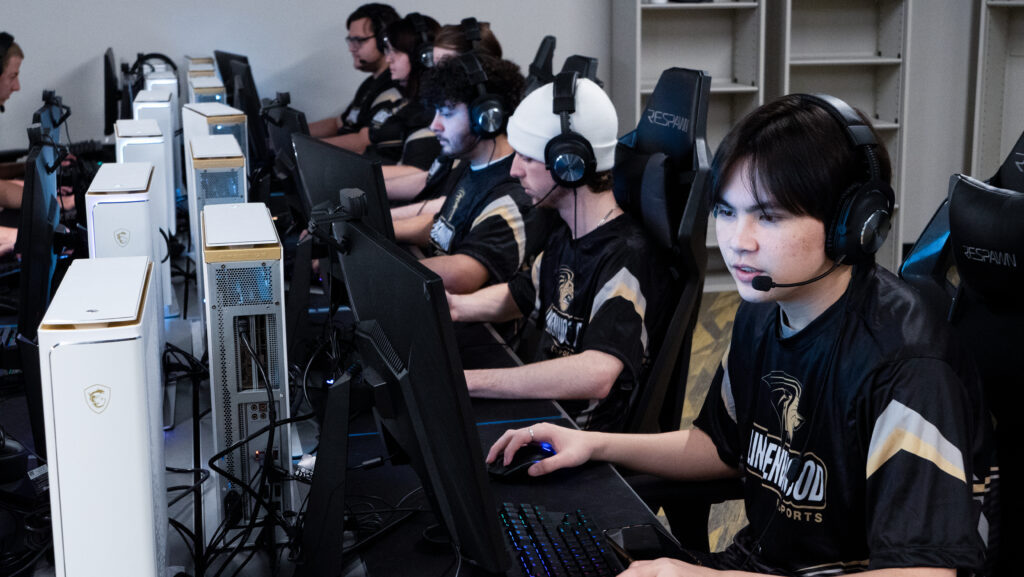Bachelor’s in Game Design
Pursue the Next Level of Your Gaming Career
Ready to make the next move in your game design career strategy? Take your passion for the creative mechanics of video game development to the next level with this BA in game design online and prepare for an exciting role on this digital frontier.
Ranked No. 1 by The Best Schools as the Best Online Bachelor’s in Game Design Programs, this 100% online game design degree program offers the insights you need to leverage basic programming skills for advanced game design and production.
Through this online BA in video game design degree program you can develop your approach to the pipeline of game design and development—exploring areas such as physical prototyping, level design, aesthetics, immersion, and usability with a focus on working with a team to take a concept from an idea to a realized game prototype. Our online gaming design degree program also explores experiential learning on two- and three-dimensional game engines such as Unreal and Unity offering the opportunity to bridge classroom theory with real impact in the field of video game creation.
Program at a Glance
3-4 years
Duration
120
Credit Hours
$495
Cost per Credit
100%
Online
Awards & Recognitions

Ranked #4
Most Affordable Online College for Art Degrees

Ranked #4
Best Online Game Design Programs
Game Design Degree Emphases
The online game design degree (BA) with an emphasis in Game Art requires 54 credit hours for completion. Including required game art courses such as drawing, concept design, classical myth, and 3D animation. This program has immersive reality game technology integrated throughout the curriculum and requires the use of a virtual reality headset identified by the department and associated applications.
Pursue your Lindenwood game design degree without a concentration focus through this General BA in game design online program. Learn the ins and outs of bringing video games to life through cutting-edge techniques and technologies in this online game design degree.

Course Spotlight
Your online game development degree coursework can advance your game industry expertise to the next level. Learn to master the game design life cycle, and round out this central focus through supportive coursework in topics such as the following:
- Introduction to Game Design
- 3D Graphics
- History of Games and Critical Theory
- Level Design
Career Outlook
Graduates can leverage their techno-creative skill sets across game design and production in roles such as special effects artist, animator, web developer, or digital designers. According to the U.S. Bureau of Labor Statistics (BLS), special effects artists and animators can earn up to $78,790 annually. Web developers and digital designers can earn up to $78,300 annually.
Admissions Requirements
For admission to your online game design degree, you will need to complete your online application and submit the following documents:
- Online application
- Official transcripts
From all colleges and universities previously attended. If you have fewer than 24 college credits, you will need to submit your official high school transcript.
If cumulative college GPA is below a 2.0, the following will also be required:
- Résumé
- Letter of intent/personal statement
(1–2 page document indicating your interest in the program and Lindenwood)
Tuition Details
The cost per credit hour for this program is $495. Besides affordable tuition, we offer a generous transfer policy of up to 90 credits toward your degree completion to further offset tuition costs, saving you time and money on your education!
Frequently Asked Questions
A Bachelor’s in Game Design can give you the fundamentals in the gaming industry to prepare you to pursue game design roles, along with other roles in this growing industry of video game innovation.
A Bachelor’s in Game Design can give you the fundamentals in the gaming industry to prepare you to pursue game design roles, along with other roles in this growing industry of video game innovation.
Why Choose Lindenwood University Online?
Since 1832, Lindenwood University has served students worldwide with affordable, high-quality academic programs providing real experience and real success. After nearly 200 years of academic excellence, Lindenwood is committed to a set of core values, including integrity, dedication, excellence, creativity, and community.
Quality
We evolve our online degree programs to reflect the latest in academic research and innovation and to meet the top standards of higher education.
Affordability
We are committed to offering our students studying online low tuition rates on top of multiple ways to save on your education.
Career-Focused
Our programs align curriculum to industry realities from experienced instructors who share real-world insights.
Support
We employ experts who are dedicated to helping our students with financial aid planning, enrollment counseling, tutoring services, and more.
We are committed to helping you succeed.
Throughout each step of your online degree program, you will receive support. From enrollment and tuition planning to staying on the right track, your support team is there to ensure your success.
